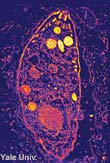We may finally have an explanation for LLC 

Scientists estimate that the parasite has infected about 3 billion people, or about half of the human population. Studies by researchers in the Czech Republic have suggested T. gondii might have subtle but long-term effects on its human hosts. The parasite is thought to have different, and often opposite effects in men versus women, but both genders appear to develop a form of neuroticism called "guilt proneness."
Other studies have also found links between the parasite and schizophrenia. T. gondii infection is known to damage astrocytes, support cells in the brain that are also affected during schizophrenia. Pregnant women with high levels of antibodies to the parasite are also more likely to give birth to children who will develop the disorder.
In light of such studies, Lafferty wondered whether high rates of T. gondii infection in a culture could shift the average personality of its individuals.
Other studies have also found links between the parasite and schizophrenia. T. gondii infection is known to damage astrocytes, support cells in the brain that are also affected during schizophrenia. Pregnant women with high levels of antibodies to the parasite are also more likely to give birth to children who will develop the disorder.
In light of such studies, Lafferty wondered whether high rates of T. gondii infection in a culture could shift the average personality of its individuals.



Comment